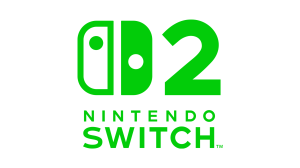Every week, we’ll be featuring a local comic book shop that our staff and/or our readers believe is worth celebrating. In our inaugural entry, I went back to my childhood stomping grounds: Time Warp Comics in Boulder, Colorado. For over 40 years, Time Warp has been the go-to spot for comics, sci-fi and fantasy novels, geeky collectibles, and (at one point) even pogs. Recently, shop founder Wayne Winsett handed the retailer over to a new owner, Kelly Cooke. As a longtime Time Warp regular, having learned just about everything I know about superheroes from Wayne (which turned out to be surprisingly useful in my eventual career as a film critic and entertainment journalist), I sat down with both of them to discuss Time Warp’s four decades in comics retail: how it got started, how it survived, and where it’s going next.
Videos by ComicBook.com
Want to see your favorite comic book retailer spotlighted on the site? You can recommend your local shop by e-mailing us at [email protected] – please include a little bit about your relationship to the shot, a couple reasons why you love it, and why you believe it would make for a unique or especially interesting entry in the ComicBook Shop Talk series.
Time Warp Comics
| Website: https://timewarpboulder.com/ | Email: [email protected] |
| Address: 5290 Arapahoe Ave Unit K, Boulder, CO 80303 | Facebook: TimeWarpComicsBoulder |
| Phone: (303) 443-4500 | Instagram: TimeWarpBoulder |

The Time Warp Comics Origin Story
Ben Kendrick: You and i have known each other a very long time now, probably 35 years?
Wayne Winsett: I’d say that’s pretty darn accurate.
Ben: Because when I first came into Time Warp, it was over on Pearl Street. It was when you had the shop over there. I know your story to some extent, but for the purposes of this, can you tell me how you got into comics? And then talk a little bit about how you ended up, starting your own shop?
Wayne: Well, back when I was a little kid I lived in Long Island, New York and my grandmother used to take me to pick up my grandfather at Grumman Aircraft after he got off work. And while we were waiting for him to get off work we would go to a place across from Grumman called The Farmer’s Market. That’s all it was called. And they had a little booth there that had used books and comics. It was right next door to a little theater for kids – and it showed little rascals all day long. That was really cool. I could go sit in there, and then we’d go look at comics. And they were used comics, they were real cheap. They were a nickel a piece.
She got me reading those because I wasn’t a very good reader when I was a little kid. And I just read more and more and more and really, really started to enjoy them. I read everything there was: Archie’s, Harvey’s. I really liked the DC superhero stuff (Superman and Batman). They were goofy in the 1960s. But they were easy to read and they were a lot of fun. And that’s how I really started getting into comics. I got addicted at a very, very young age. Pretty much learned how to read, basically, with those.
I had a lifelong love since then, and moved out to Colorado after I got out of the Air Force in the late 1970s, and come down the hill on Arapahoe. My wife at the time said, here’s Boulder. There’s a little comic book shop and I think you’re gonna really like it. I had never been to a comic book shop – we just had grocery stores and drug stores (7-eleven type places that had spinner racks with comics) but coming down Arapahoe into Boulder, we came down to Pearl Street to 1717 Pearl and there was the original Mile High Comics store. It was really just one long narrow store and I remember buying Howard the Duck #1 that day and a lot of other books that I hadn’t been able to find on the newsstands.
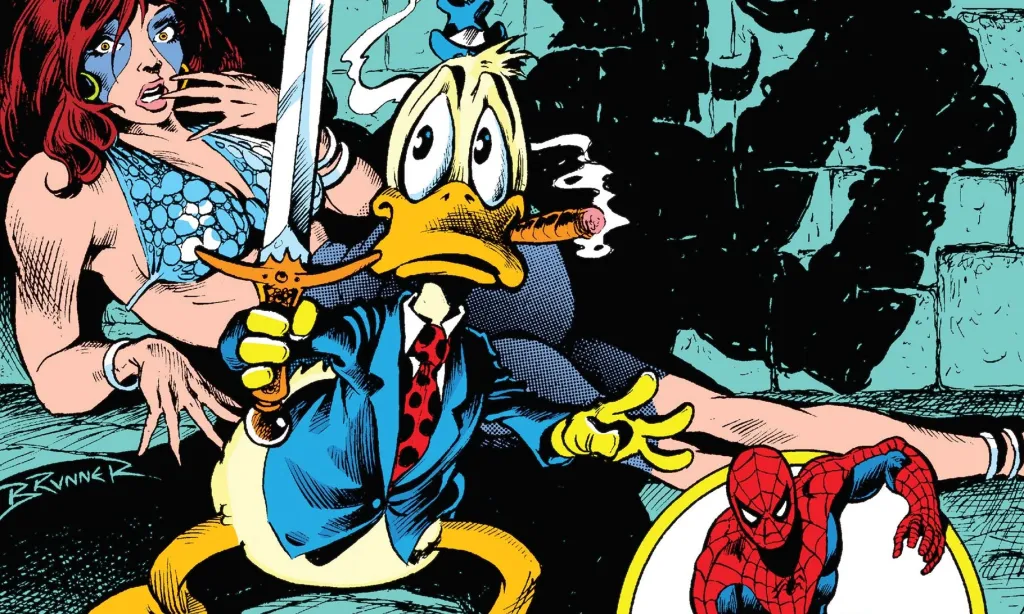
I started going to CU for college to be – I wanted to be a child health physician’s assistant. And in between semesters, between the second and third year, Steve Swink, who was the manager of Mile High at that time, offered me a summer job in between. I was like, “sure.” Because I was always the first customer there every new comic book day and I’d help put the comics out for them. And that way I could get my comics first before anybody else. I was really an addict, I really was. I started working there in the summer and Steve left (he went to Geppi’s Comic World in Baltimore) and became the manager – and Geppi of course owned Diamond Comics (which is a pretty ugly situation right now, that’s a whole other podcast).
Kelly Cooke: I could talk hours about what happened with Diamond.
Wayne: I read all that still. So, I was a really young 20-year-old, and I was working. They had a book section down below. It had science-fiction fantasy books and upstairs was the comic book section – and I was working for a 14 year old kid named Tim Miller who was really, really a sharp kid and he was my boss. I remember telling him: “you can tell me whatever you want me to do but I’m not gonna do it. I’m not listening to some kid.” [Laughs] But we’ve become great friends. But when Steve left I I ended up becoming the manager and a couple years after that, Chuck Rozanski, who had five stores at the time, said he was getting out of retail and just going to concentrate on online and offered all the stores for sale to his managers. I had just gone through a divorce and I was pretty undecided on what I wanted to do with the rest of my life and I had opinions on working for Mile High Comics and said, “I think I can do a better job of it.” Against the wishes of my parents and lawyer and everyone else who said [Chuck] has just giving you enough rope to hang yourself, I decided to do it anyway. I was 30 years old. All the Mile High Comics stores were affiliates at that time – which was a franchise-type of thing. And that’s how I started out. Bought my store September 29th, which is today (the date of our interview), 1984. It’s 41 years today, which is pretty damn cool – that you’d be here on that particular day.
Ben: What a coincidence! That’s really cool.
Wayne: I already put on Facebook that today’s the anniversary of Time Warp. That’s awesome. And that’s really how I got started with it.
Ben: That’s amazing. And so, and the name Time Warp, if I remember correctly, you told me it came from a pinball machine?
Wayne: It was! Of course, the Rocky Horror Picture Show played a role. And I had been playing a pinball machine that’s out in my storage unit – and Kelly’s probably going to get it here soon. It was a great pinball machine, and since we carried science fiction and fantasy stuff at the time (that was really our biggest focus, not even comics at that time). It just made sense with the movie and the books – and a pinball machine. I was actually gonna call it Fantasy Works. I really liked that name and then another one of the affiliates down in Denver, Mark Hamilton owned that and he named it Fantasy Works.
He named his store Fantasy Works two months before and all of a sudden I had to think of a new name. I was walking down the Pearl Street Mall one day and it was just “Time Warp,” that sounds good and that’s what it became.
Navigating The Evolution of Comic Book Retail
Ben: Back in those early days you were selling the books, I know over time you started getting more into the collectible side and things. Was that a necessity, in your opinion, in terms of evolving as what people collected was evolving? Or was it more of a personal passion for you that also happened to be another thing you could offer customers?
Wayne: Well, I love the comics. I was into the comics. But then, getting familiar with the books, I started really enjoying a lot of the fantasy and science fiction books. I would go down to a place in Denver called Gordon’s that was a book distributor – and I’d just go in there for hours and hours and pick stuff up for the store. It was very, very fun. I became a Philip K. Dick fan. A lot of other great science fiction authors, Heinlein and Asimov – and all those. I was addicted to those too but the business evolved and morphed. Borders and Barnes & Noble and places started really carrying heavy books here in Boulder – not to mention discounting their’s if you’re a member of their club. And it just didn’t make sense to continue with the books anymore, really. At the same time, it was also Pogs, Pokemon cards, Magic cards – and all that stuff started. You can’t make a business like this work just carrying comic books, I don’t feel. You had to diversify into something else, and if the books didn’t work, you had to find something new. It just morphed into trading cards and then eventually action figures and statues – and everything else. It is continually morphing at this point.
Ben: My dad still has the Randy Bowen Batman statue from 1992, I think? It was one of the first big statues that you ordered for us. It has him poised on top of a gargoyle but i remember you sold it to us.
Wayne: I still have mine actually, it’s a cool piece. I think your dad bought one of those little Wolverine ones too. Those were fun times, getting some really different stuff that nobody had ever seen before – and that was a really nice side lane to have.
Ben: It’s cool how it all evolved into that because some of those were really truly beautiful pieces – and now Sideshow Collectibles and Prime 1 Studios, those guys are doing just crazy stuff. But I remember that Batman being the first time I ever saw a piece of physical art that was pulled off the comic book page. You have those grail pieces you remember from when you a kid and that was definitely one of ours. So, you were finding these other lanes (Pokemon, action figures, and other collectibles) that started popping up. In spite of all that, what do you think is the biggest challenge that you faced throughout all that time? What was the hardest part? Because most of those Mile High Comics affiliates you mentioned went out of business.
Wayne: I was the only one that ended up, out of the five, paying all that I owed to Mile High Comics. It was a 10-year term and it was $225,000. Wow. And I paid it off and I was very, very happy about that. Two of the guys, sadly died. And two of them just couldn’t make the payments. One guy never finished making payments. And I remember Chuck saying, “ah screw it.”
Ben: One of the things I always loved about you: even when you were busy, you would shoot the shit with us. You knew my dad and you knew me. I think that was a superpower of yours – connecting with your customers. Do you think that’s what made you able to keep going when other stores didn’t make it?
Wayne: It’s one of the things, I’m sure. When you love something and you can impart that on other people – and get them excited about what you’re excited about. It’s a great thing. I still love that part of it. Turning people on to what I love and being able to guarantee if you read this, you’re not going to bring it back – or you’re not going to come in and say “that was a bad choice .” Time Warp was always very strong in customer service. I think that’s one of the most important things a small business can do.

Kelly: I definitely agree with that. I think that one of the big draws that I had when I came into your shop 33 years ago was your ability to just talk about anything. You want to talk about DC? See I got these DC Comics. You want underground? Let’s talk about that – and you always had a point of saying, “Hey, you should go read this. It’s not my gig, but it’s really good, I think you’d love it.” I think that mentality is one of the major reasons why Time Warp is still here – because we very much focus on getting the experience right. Anybody can go to Amazon and buy comics. They can buy them a lot cheaper than what we can sell at – they may even get it sooner than they could buy it from us – but we need to be able to motivate readers to actually come into the shop. In my mind, that is all about experience – that’s why i want to go to the shop. Because I get to rap with all these people, I get to browse and look at new stuff. I’m finding all of the geek stuff that I love. And that is just invaluable. It’s irreplaceable.
Comic Book Store Regular Turned-Owner
Ben: That’s a great transition. You two also go way back. Now that you own this shop, you own this legacy, what was your first experiences with Wayne and being in the store?
Kelly: My favorite stories, although I edited a little bit because of the your son, but I’ll put that one back in. I grew up in this town and me and my buddy Ty, we romped all over the city, and we were driving around and we passed the shop on Pearl Street. “I don’t know, what’s that? Oh, I don’t know, that’s cool.” And then we just wandered away. The next day, one of my friends, his name was Luke, he says, “Dude, we’re going to go to a comic book auction tonight. You want to come?” I’m like, “Sure, let’s do it.” And that was the first time I saw Wayne, the first time I entered the shop, it was his seventh anniversary sale. And he had a big cake. It was awesome. And I remember everybody’s just happy. And then Wayne’s son rolls up to the cake and scoops up a giant piece with his bare hands – he’s just running through the place with a handful of cake. It was awesome.
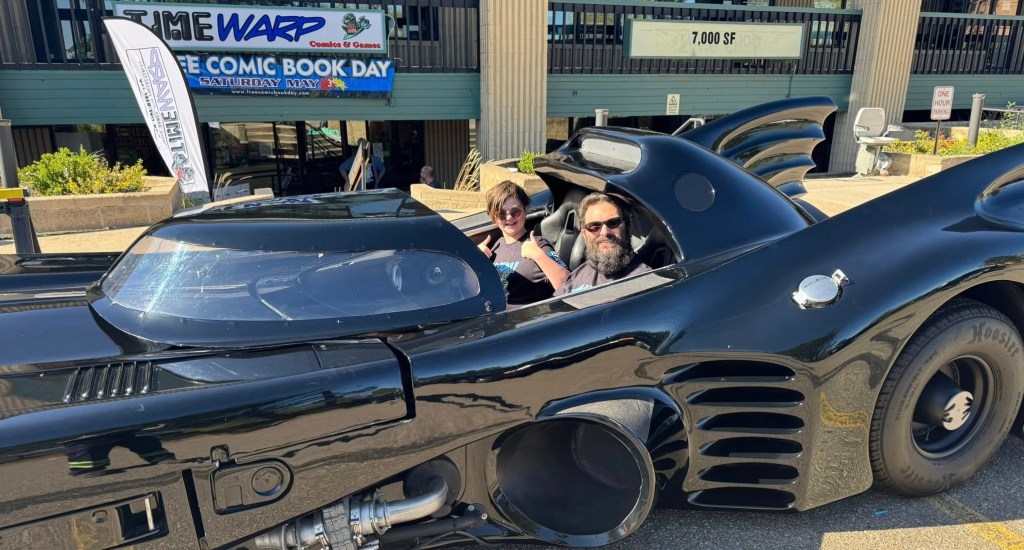
At that moment, I knew this was something special and I knew that I wanted to be a part of it. That night, I bought my very first comic from Wayne. It’s actually hanging up over the front door here at the store – and every comic that I bought from that point on was from Wayne. I didn’t have a huge collection, but I’d always come in and talk to Wayne because he would always give me good advice. And they always had it available. We pride ourselves on having stuff in stock. It’s, “Hey, I just got this cool trade in. You should read it.” But that was really the first experience I had with Wayne and that whole interaction between people who love this stuff. It just became part of our life for a good two or three years – everyday we were at the comic book store. Then we got older and got girls and high school and then college and blah, blah, blah. But I never really went away from it; though, I did stop collecting for a while. I shifted into trades. I would pick up trades and read the stories.
Then, one day, I was sitting in the house, and my dad – who actually reads paper print newspapers – sends me an article that Wayne put in the Daily Camera explaining he was seeking a buyer and saying, “Hey, we got to 40 years. I’m going to hang up my cap.” And I looked at my wife and I go, “You want to buy a comic book store?” And we both just laughed at it, whatever. Who buys a comic book store in this day and age? And we just let it drop. But as happenstance, we were in Boulder because we were going to Aqua Imports [a local pet store] to get some fish for my daughter. Its two blocks from the old Time Warp location. And we just stick our head-in and see what’s up. Wayne was there and we started talking – and it was just one of those moments, at least for us, we knew walking out of the store that it was going to happen. We knew we were going to fight tooth and nail to find a way to make it happen. It’s amazing. We take very, very seriously the reputation and brand that Wayne has built and I think that is, in our case, the secret sauce. We need to tap into that aspect of this to really think about bringing in new people, expanding our footprint. It’s important that we get new kids in and starting to read.
Ben: You guys are in a college town, was that something that you ever engaged with or that you have ideas for how to engage with even more? I assume that helped you in some way that you had this group of young people who were constantly in transition.
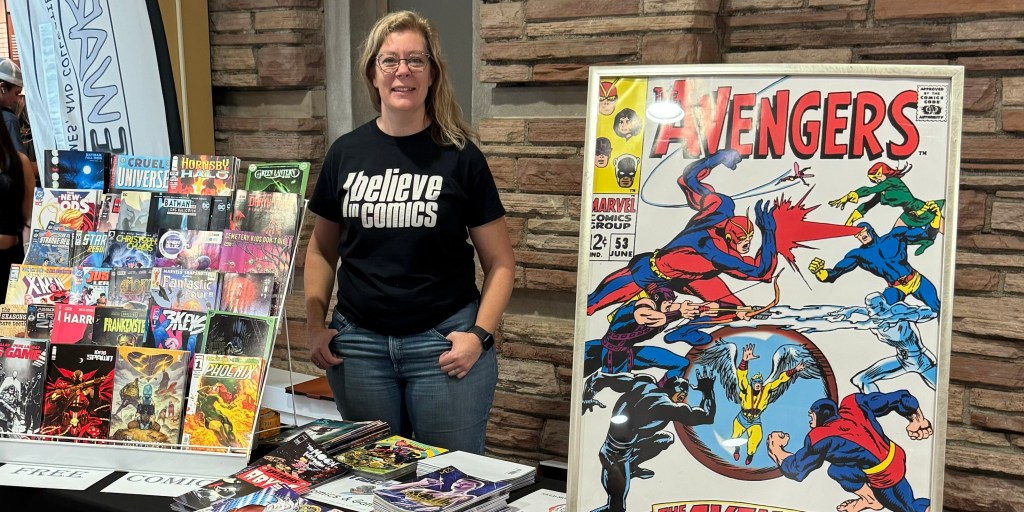
Wayne: It was always an important part. You need the college students for sure, because they’ve got money when they come to town. Pearl Street was pretty good because it wasn’t too far from the campus. And then our other shop down on Arapahoe and 28th was good because they could just walk down the hill and come here. One of my biggest mistakes was moving up to the north end of town – because then students from the college had to take two buses to get to the store. They’d have to go from the CU Boulder campus to Pearl Street, then get another bus to come up to 28th. I didn’t know that when I picked that spot. And that was a dumb thing to do. But we did a lot of ads, and the coupon books that are always on campus, to entice the students to come in and get a little discount. The big fallacy with that was they were smart kids – and they would grab stacks of coupon books and then every time they’d come in, they’d give us a new coupon. Every week. You’re not making the full nut that you need to make.
Kelly: But college kids are very very important to have for this store. This year, me and Dottie (my wife), we went up to CU and we got a table at the UMC on that first week – as all the freshmen were coming back. We setup our table right next to the Starbucks at 8:00am and we did not stop talking to people until 5:00pm. And at that point, we were telling people we had to go, “I’m sorry, we gotta go.” But we brought a whole bunch of overstock comics. We brought a lot of stuff from Free Comic Book Day. And we were just giving comics out to everybody left and right. And we’d give them a card and say, “Hey, when you come into the shop, here’s the thing to check out.” And we definitely saw the week after, there was a bump. And then the week after that we started to see a lot of people that came in who were totally new. And they were asking questions: “I’ve never done this before. What should I read?” It’s amazing.
I really feel strongly that the kids really need to get involved. One of the things that I’m trying, that I’m doing now is I’m going to elementary schools and middle schools. And talk about the art of storytelling. Last week, everyday, I was in a creative writing class talking about the Hero’s Journey – and then the week before that we were talking about the history of comics and how they’ve impacted society. The thing that you said Wayne about being able to read, that that cannot be overstated. It’s really important and it’s one of those things that I’ve seen firsthand with my daughter. She hated to read. If you put something in front of her, she would full-on table flip, scream, yell, and freak out. We used to call her the Tiny Pink Hulk. But I then, I dropped a Wings of Fire graphic novel in her lap. I said, “Check that out.” She read it in about two hours, came back, and said, “Are there any more?” And I’m like, “Yes, baby, there are.” And since then, she reads unbelievably well. She’s reading right now, I bet. She reads at least two books a week. She’s reading comics all the time, both digital and paper comics. I use that as an example when we go into the schools” “Dude, this is reading and this is awesome and this is art. You need to come and really look at it. Because it’s the gateway into everything else.”
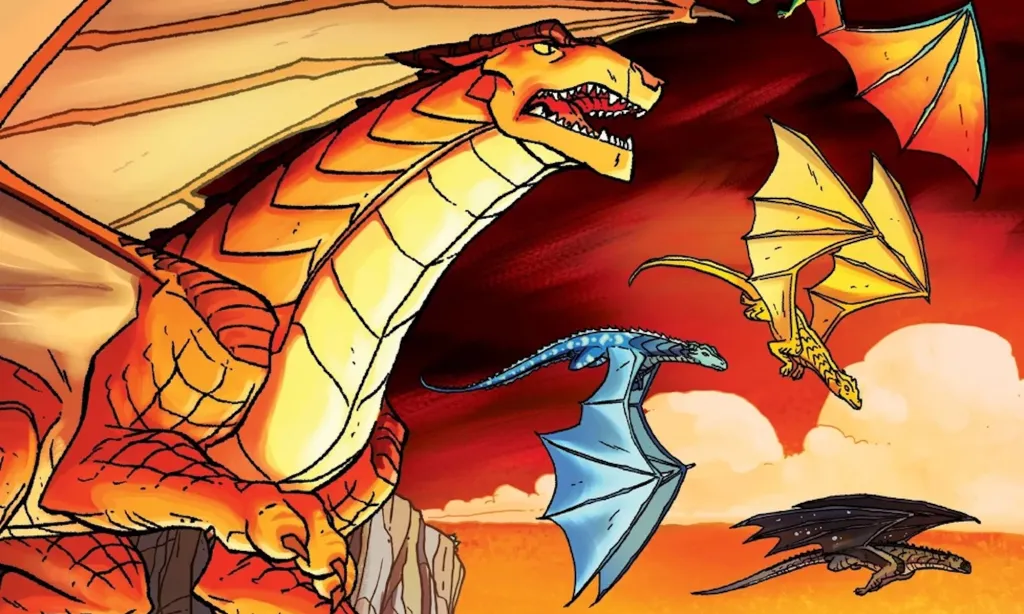
Wayne: As a matter of fact, that famous quote from Art Spiegelman, the guy that did Maus, was “Comic books are a gateway to literacy.“
Ben: I think it’s really true. My daughter is really into the Scooby and Krypto – the little mini-comic book. And she loves them because there are colorful pictures and the stories are digestible. She can see the physical comedy and there are fun words to say that she recognizes, “zip,” “zap,” “boom.”
Kelly: I won’t go too deep into this because it’s long and I talk too much but one of the interesting things about comics and what they bring to kids is: when you communicate, we’re gonna sit here and talk – the message that I’m sending you in the actual words that I’m saying is only 7% of what I’m saying. The rest is tone and timbre, pauses, and then non-verbals, right? All of that makes up everything else. Comics are the unique form of being able to present both the written word but also show body language, tone, and timber. For someone who is a new reader, and their “theater of the mind” isn’t very good yet, it is perfect for them – because they can just look at it and totally get it. Whereas in a chapter book, they might not fully get it.
How Comic Book Retail Changed (& What Still Needs to Change)
Wayne: One of the things we discussed previously that I wanted to highlight: what has changed in the years, since I started in the business? Everything, there were no computers, no cell phones. We had to do everything by hand – on 3×5 index cars to make sure that people got what they were looking for if they were asking for something. And I only had one female customer for the first five years that was a regular. There were no girls or women coming into the store. It was a male-dominated thing. And that has really changed. Manga sure helped. And Sandman, that appealed to girls. That has really changed. Distribution has changed many times over the years. We had to do those auctions to cover our nut – in order to pay Mile High Comics. We’d do those every month and they were a lot of work. I did them every month for 25 years.
Ben: Those were smart though, those were a lot of fun. I remember going to those. My dad and I would come in and know exactly what we wanted to win.
Kelly: And people would run up the bill on you – and you had to really decide, “How bad do I want this? You were doing that before eBay became a thing. They were great. I loved them. Everybody was great. Some of the best memories that I’ve had in this whole fandom were at one of your auctions.
Wayne: I loved it and once COVID hit, we had to come up with some other way to make money – and there’s another store down in Thornton. That’s our sister store, I Want More Comics and they were doing a thing they called “Stream sales.” They’re a lot like auctions but different – because all the prices are already set. We do do it online and they’re doing them once a month here. We were doing them every other week and that was also very, very important after COVID. You build up a community online and those people, there are people from Florida and Texas and all kinds of different states that are participating. That’s been very lucrative.
Ben: That’s cool, that you were actually able to build a fandom outside of the local community. The reason I wanted to do this series was to stress the importance of supporting local retailers, so it’s great that you’ve been able to build support outside of your local communities.
Kelly: We had a couple came in come in last month and they were from Germany. They lived in Berlin – and they walked into the shop and just stopped at the door. They were like, “Oh, my.” We started talking and and they were saying stores like this this don’t exist in Germany. We’ve started working with them and we may end up shipping one issue of every Marvel title that comes out every Wednesday across the pond to Germany. Then, conversely, one of the things we really want to focus on going forward is that local community. And bring in the kids that are within walking distance – and talk to the schools about bringing the kids here into the shop. I think it is paramount to our success. This week we started a drop-in Dungeons & Dragons club to help kids, “Come and learn how this works.” That’s gaining some good momentum. We’re doing that every Thursday afternoon.
But eventually I want to pivot into teaching, actually run a class, a seminar that says, hey, this is how you run a good game. This is how you do world building. This is how you do NPC. I’ve found that because many people are just getting saturated by D&D (the movie, The Big Bang Theory, Stranger Things, you name it), it has never been more popular ever in history. I started on First Edition A, D&D. To be able to bring that love and that aspect to the kids is one of my favorite things. I love it much. To see them sit in here and pretend and have this awesome time, then walk out onto the floor, I’m gonna get this new comic while I’m here. That’s how I got into this fandom. And then all of a sudden you have a new reader who’s hip deep in awesome stuff.
The Frustrating Disconnect Between Superhero Movies & Comic Book Retailers
Ben: There is a pretty significant disconnect still between the people that go see a Marvel movie and a DC movie and the people that actually read the books. What do you think the solution is to that because I talk theater owners as well as the studios. It seems like something no one has really cracked.
Wayne: They want to sell comic books in the theaters and they’ve done it (especially for the first Batman movie) and it does raise awareness of the whole medium. That is really important – with all the TV shows and all the movies, it definitely raises the awareness. Unfortunately, with a lot of the movies, it’s a temporary thing. They come in and go, “Oh, what do you got on this?” And then you may or may not ever see them again. We’ve been trying as retailers to figure out how to use that as a gateway for them to come to the stores. And it’s been really, really tough. They should have, we’ve always thought they should have a tagline at the end the movie: “If you liked this movie go to your local comics bookshop and it has the address and all that. They’ve dabbled in that a little bit over the years but it would cost us money instead of the the studios.
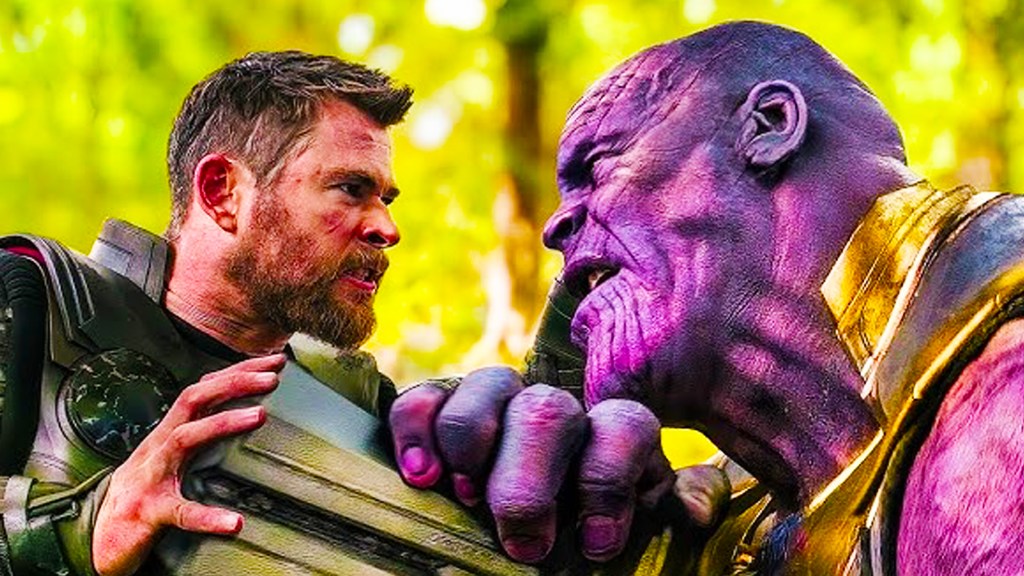
Ben: You would think that there would be something in these movies at the beginning or at the end of the movie (right after the post-credits scene), it would be great if they had something (maybe a QR code that they scanned) and you could find your local comics retailer. That was our whole thing at ScreenRant and ComicBook, as well as sites similar to us, a lot of why we were successful was being able bridge that gap. You trained me how to be a nerd and talk about these books and characters. I’ve read them, so I have an informed position about what to expect in Avengers: Doomsday based on the knowledge I have from comics. I genuinely think that’s the reason these fan sites have existed and done as well as they have – is because there was an absence on each studio’s part in making those connections and drive people into your stores to learn that information themselves.
Wayne: It’s the missing link.
Kelly: The missing link. One thing contributing to that: people who read comic books. We have an understanding of how a story can span ten years and have a creator come in and it goes in this direction and then is taken over by another creator and it goes in this direction. “We’re going to retcon for the sixth time? What?” Blow the universe up and rebuild. These are all things that we accept as part of what comics are. Then you go to the MCU and you start going out to all of these people who have no experience in that. And when they look at the MCU, they’re equating it to what they know, which is movies and sequels and tie-ins. The reality of it, that’s not it. They’re comic book movies. And I think that has been their downfall, that they are still trying to make a non-comic book movie that appeals to the masses. Go for it, man. Please do. I always want more people in here. But there is a very, very strong and large group of people that loved the movies and have no interest at all in the comics which means they haven’t found the balance yet.
Ben: It’s true. It doesn’t help that the movies end up being such a distilled version of the books they’re based on. Calling Captain America 3 “Civil War,” it wasn’t a built-up storyline that explored the conflict from a variety of perspectives. Instead, over the course of 2 hours and 30 minutes, they have a disagreement, they fight, and then things are resolved. Whereas that comic series spanned months and the conflict was explored through a variety of perspectives – via characters with intensive feelings about the situation. Not to mention, the weirder the MCU has become, a lot of people have fallen off too because now we’re getting into actual comic book adaptation territory. The more of that we give them, the more people just want Spider-Man.
Kelly: I want the big explosions and I want Thanos to do the snap and I want the big CGI battles. That is a very large draw for the folks that go and me too. Going to that is a festival of sight and sound. And seeing it in the movie theater is different than seeing it at home. But it is different than what we’re selling and doing in comic books. The media is not the same. And when they do start doing the wacky stuff and pulling weird characters from the vault, the majority of the people who have no idea what comics are, who the heck is this guy? Why is she here? It jars them out of the movie – and makes it even harder for us to get them back.
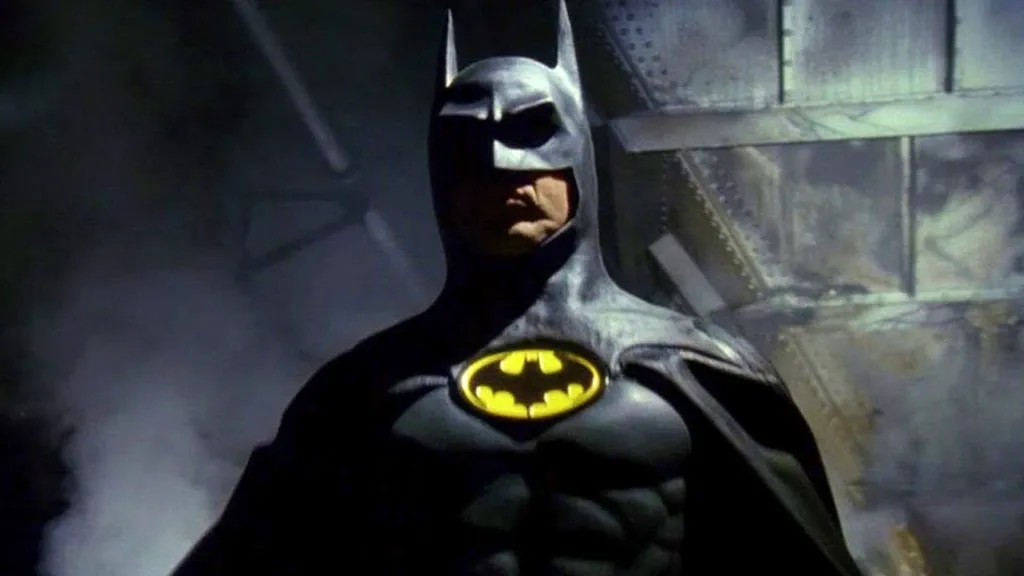
Ben: Do you recall if you thought Batman 1989 was the first movie where you were really believed the genre was about to really pop?
Wayne: Holy crap, yeah. I thought it might because they did they try it with a couple other ones before that but that felt like a shift. Absolutely it was very very pivotal. It’s one of the most important parts of the 1980s. Anything they did before that was, with a few exceptions, just a joke. The Batman 1966 TV series and all. Finally, people were taking it serious. And Michael Keaton did a great job. And Jack Nicholson did a great job. And I thought “Huh, there’s something to this.” And look what it is now.
Kelly: The line in the sand where the before and the after happened. Happened was the ’89 Tim Burton Batman movie because that that put it in a context that anybody could look at and say, “I know who Batman is. Let’s do this.” It was easy to just spoon-feed that past life into them and bring viewers into the fold. Then we got the Tobey Maguire Spider-Man – which was an amazing flick because it totally broke the entire genre of the superhero by bringing a teenager with problems into the world – and we love him.
Ben: I’m very interested to see what DC does right now with James Gunn. I actually liked Superman a lot. The trailers didn’t initially sell me. I enjoyed a lot of the Snyderverse, even though it was dark. But I think, at this point, I feel more connected to the 2025 movie than the Snyder run.
Kelly: I loved it. I loved it. It was an amazing movie. I completely agree. I loved the Snyderverse. That four hour movie that he did, me and my buddy Bill sat down one day and we’re just going to power through it – and if you have the patience to wait and watch a four hour movie, that’s the one because it’s damn good. But it is four hours. Then they bring in David Corenswet guy, right? And one of the reasons that I love Gunn, he’s such an amazing storyteller. The first thing that you see in the movie is the wastelands. And then you have that 300 years ago, 30 years ago, three minutes ago.

Then you see Superman go bang, and, he’s all messed up. He’s bleeding, he’s hurt. He’s defeated that was the first impact that you saw with this superhero and that builds in such an incredible foundation to that character – because they show right out of the gate: Hey, he’s Superman but he’s not all powerful he can bleed and he can lose and that is the key to the whole rest of the movie. And because they did that setup with with Krypto, when you look at the thesis of Superman – that Superman is trying not to kill everybody who took his dog right. It’s really about trying to move Superman down to be chill and not just go to Lex Luthor and pop him. It was all about the dog. The dog was the super objective through the whole movie and then you have the greatest payoff at the end when Kara comes in and gets Krypto – and you realize it wasn’t even Superman’s dog. He was going to go to the ends of the earth, gave himself up to sit in a kryptonite vault, because of the dog – and that I think is such an amazing statement because it brings superman into our world. You can look at him and say, “I get this guy.”
Comic Book Recommendations from 40 Years of Time Warp Expertise
Ben: Comic book recommendations! If someone new was coming into the store and they had said, “I want to get into comic books. What should I read?” What would you have told them?
Wayne: Well, there are many. There really are. It really depends on their interest. If they like superheroes. If they like horror. There’s been a lot of go-to ones for me over the years. I’ve really liked. Since we’re on the subject of Superman, All-Star Superman by Grant Morrison. Frankly I think that’s a book that everybody is going to pick up and love. Money back guarantee. Every time. And there’s many things that. There really are, Ben. I could go on and on for a half hour just telling you the ones that I could guarantee you’ll love. But that’s really a great go-to. And there’s the classics Dark Knight for Batman. And Maus is very, very important. Watchmen, of course, has been definitely a huge go-to for me because it’s a thinking man’s book.
Ben: Is there one that you personally love the most out of your entire collection?
Wayne: I was always a big fan of all the Thanos stuff they did. The Infinity Gauntlet series was one of my all-time favorites for sure. I’d still love to see a full depiction of that entire run as an animated series.
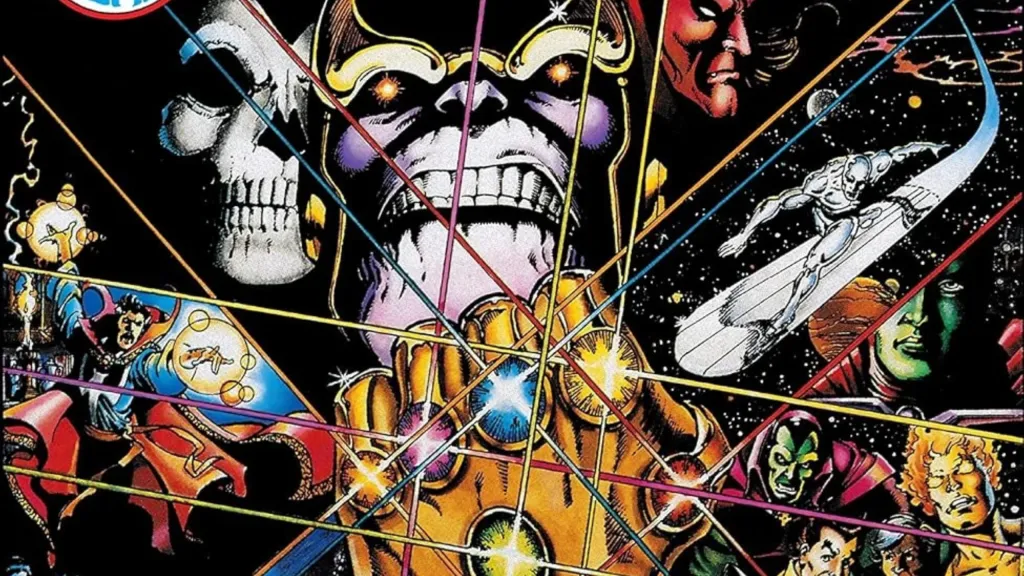
Kelly: There area lot of them. But I was always a big fan of the Legion of Superheroes too and I have every single appearance of the Legion ever. That’s always been my go-to superhero book but I would agree with Wayne. There’s so much out there and that impossible question needs to be broken down. When people come in and they say, “Hey, what should I read.” I always ask them, “Well, what was the last book you read? What was the last movie you saw?” I try and tease out the genres that they’re looking interested in. And when I figure out what the genre is, I have a handful in most of the genres that I push people to: if you want horror, you need Beneath the Trees, that’s a good one. If you want superheroes, all the things Wayne just suggested.
Right now, I am enjoying the Absolute Wonder Woman series. Amazing. I’m a storyteller. I told my first story when I was seven years old sitting around a campfire with 30 people and I’ve never looked back. And when I look at a lot of these things, I know that I’m a snob when it comes to them. But it is something I’ve looked for and very rarely saw: somebody that can actually write a good, strong woman character, and not just make her a guy in that role. That’s 99 of the women characters in the entire pantheon of media. Absolute Wonder Woman isn’t written as a guy.
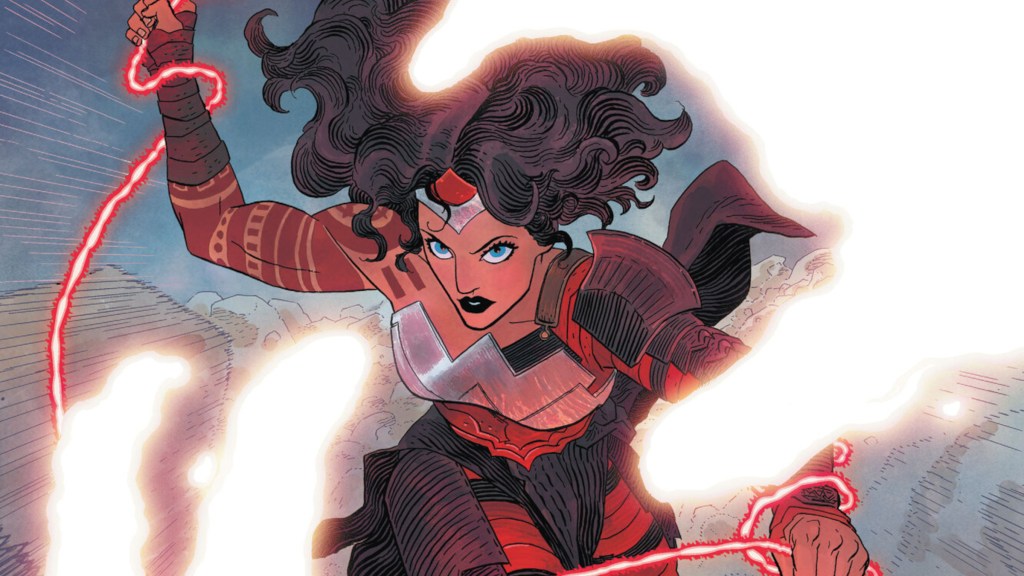
She is absolutely a badass, don’t get me wrong, but she has a level of empathy, caring, loving, and nurturing to her that makes the character genuine. It makes you think, “I get where you’re coming from, and I understand your motivation.” She is such a dynamic character. And I just love that one. I think the other two that I’m really into right now is Ghost Pepper. That one is an Image comic. That one is a lot of fun because it is not your normal trope. It is definitely a wacky one and it’s great. Then Exquisite Corpses is another one I love – that one’s fantastic.
Wayne: We’re always doing something new in comics which is exciting. Our best-selling book for the last 20 years has been Saga from Image. It’s still going very very strong. We looked one day and we noticed we sold over 500 copies of the Saga, Volume 1 trade paper. And the thing about it that’s great: it appeals to men and women equally. Sandman did it in the 80s and was a very very important series – and one, again, I guaranteed if somebody bought it, they could bring it back for a full refund. Nobody ever did they they’ve been there’s more of that coming out too right they’re dragging their feet on they do they they’re very sporadic with their singles they they’ll put.
Kelly: Saga is one of my favorites too. It’s one of the most imaginative reads, the most imaginative Romeo & Juliet story I’ve ever seen. Again, being a storytelling snob, that one is so eloquently told that you can get halfway through it before you realize, “This is Romeo and Juliet.”
Thanks to Wayne and Kelly for taking the time to talk with us – and for being our guinea pigs in the ComicBook Shop Talk series. A reminder that Time Warp Comics’ contact information is highlighted at the top of this article. It is our hope that readers will take the opportunity to follow and support all of the shops we feature in this series.
Want to see your favorite comic book retailer spotlighted on the site? Remember to submit your local shop for consideration by e-mailing us at [email protected].






